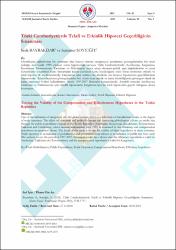| dc.contributor.author | Bayrakdar, Seda | |
| dc.contributor.author | Soyyiğit, Semanur | |
| dc.date.accessioned | 2021-12-12T16:49:14Z | |
| dc.date.available | 2021-12-12T16:49:14Z | |
| dc.date.issued | 2021 | |
| dc.identifier.issn | 1694-7215 | |
| dc.identifier.issn | 1694-7215 | |
| dc.identifier.uri | https://doi.org/10.33206/mjss.852478 | |
| dc.identifier.uri | https://app.trdizin.gov.tr/makale/TkRNM01EVTBOQT09 | |
| dc.identifier.uri | https://hdl.handle.net/20.500.11857/1839 | |
| dc.description.abstract | Liberalleşme eğilimlerinin bir yansıması olan küresel sisteme entegrasyon çabalarının göstergelerinden biri ticari açıklığın derecesidir. 1991 yılından sonra bağımsızlığa kavuşan Türki Cumhuriyetlerde (Azerbaycan, Kırgızistan, Kazakistan, Türkmenistan, Tacikistan ve Özbekistan) ortaya çıkan ekonomi-politik yapı değişimlerinin ve artan küreselleşme çabalarının kamu harcamaları kanalı üzerinden kamu büyüklüğüne etkisi iktisat teorisinde etkinlik ve telafi hipotezi ile incelenmektedir. Çalışmanın odak noktası, bu ülkelerde söz konusu hipotezlerin geçerliliklerinin sınanmasıdır. Küreselleşmenin göstergelerinden biri olarak ticari açıklık ve kamu büyüklüğünün göstergesi olarak da kamu harcaması verileri kullanılmıştır. Analiz 1997-2017 dönemini kapsamaktadır. Ampirik sonuçlar Azerbaycan, Tacikistan ve Türkmenistan için etkinlik hipotezinin; Kırgızistan için ise telafi hipotezinin geçerli olduğunu ortaya koymuştur. | en_US |
| dc.description.abstract | One of the indicators of integration into the global system, which is a reflection of liberalization trends, is the degree of trade openness. The effect of economic and political changes and increasing globalization efforts on public size through the public expenditure channel in the Turkic Republics (Azerbaijan, Kyrgyzstan, Kazakhstan, Turkmenistan, Tajikistan and Uzbekistan), which became independent after 1991, is examined by the efficiency and compensation hypotheses in economic theory. The focus of the study is to test the validity of these hypotheses in these countries. Trade openness as an indicator of globalization and government expenditure as an indicator of public size were used. The analysis covers the period of 1997-2017. Empirical results have shown that the efficiency hypothesis is valid for Azerbaijan, Tajikistan and Turkmenistan, and the compensation hypothesis is valid for Kyrgyzstan. | en_US |
| dc.language.iso | tur | en_US |
| dc.relation.ispartof | Manas Journal of Social Studies | en_US |
| dc.identifier.doi | 10.33206/mjss.852478 | |
| dc.rights | info:eu-repo/semantics/openAccess | en_US |
| dc.subject | [No Keywords] | en_US |
| dc.title | Türki Cumhuriyetlerde Telafi ve Etkinlik Hipotezi Geçerliliğinin Sınanması | en_US |
| dc.title.alternative | Testing the Validity of the Compensation and Effectiveness Hypotheses in the Turkic Republics | en_US |
| dc.type | article | |
| dc.department | Fakülteler, İktisadi ve İdari Bilimler Fakültesi, Maliye Bölümü | |
| dc.identifier.volume | 10 | en_US |
| dc.identifier.startpage | 1745 | en_US |
| dc.identifier.issue | 3 | en_US |
| dc.identifier.endpage | 1757 | en_US |
| dc.relation.publicationcategory | Makale - Ulusal Hakemli Dergi - Kurum Öğretim Elemanı | en_US |



















